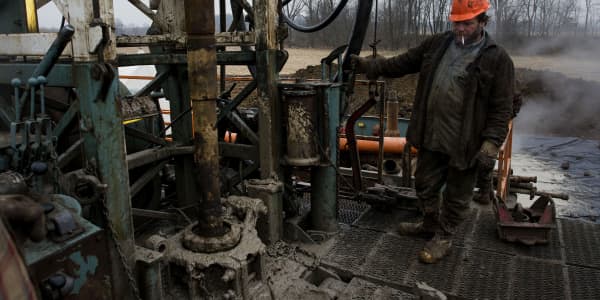With explosive growth in shale oil and gas, some experts say that the U.S. has leapfrogged Saudi Arabia as the world's biggest oil producer. But more energy watchers doubt it.
Last week, Bank of America caused a stir with a new report that said the United States had already surpassed Saudi Arabia in oil production. Saudi Arabia churns out 10 million barrels a day in crude production. According to BofA, U.S. oil and liquids from natural gas exceeded 11 million bpd during the first quarter.
When factoring in the broad range of domestic fuels—which can include conventional and unconventional oil, condensates and biofuels—"it's very possible we've passed Saudi Arabia in production, and if not it should happen pretty soon," said Jason Bordoff, director of Columbia University's Center for Global Energy Policy.
Read MoreHow a shale byproduct could open up US oil exports
Not so fast, say other energy watchers. In data issued this week, the Energy Information Administration (EIA) said the U.S. produced only 8.1 million barrels per day of crude during the first quarter. Even when including other petroleum-based sources, the amount produced still doesn't put the U.S. close to surpassing the Saudis, some say.
"If we take the EIA numbers, then for the U.S. to surpass [Saudi Arabia] next year, we'd need to increase production by 1.7 million bpd in a year," said Chris Nelder, an independent energy analyst.
"That's absolutely not going to happen," Nelder said in an e-mail, citing the trend of the last three years, which have seen the U.S. add about 1 million bpd per year. "We won't add a million barrels per day in 2014. This year we'll probably have more like a 500-700,000 bpd increase."
Almost, but 'not quite'

To be certain, 2013 was a big year in U.S. energy. Oil boom regions like North Dakota—the epicenter of Bakken shale production—and Texas are now producing more than 1 million barrels per day of oil. Despite setbacks such as the downgrade of California's Monterrey shale estimates, the U.S. is still considered a fossil-fuel powerhouse.
BofA is far from alone in its aggressive projections. Just last year, no less an authority than the International Energy Agency forecast the U.S. overtaking Russia and Saudi Arabia by 2016. Around that time, independent energy firm PIRA also issued data suggesting America had already left the OPEC giant in the dust.
Still, others say uncertain global growth and fuel demand make massive strides in U.S. production unlikely for now. Oil giant BP said in its annual outlook that crude "is expected to be the slowest growing fuel" over the next 20 years or so, even as it predicted the U.S. would provide the largest non-OPEC supply.
Read More 'Small number' of gas drilling wells shaking up Okla., study says
Additionally, BP's own data suggest the U.S. is still running behind Saudi Arabia and Russia.
"U.S. crude is growing by 1.3 million bpd this year. That's certainly enough to surpass Russia this year, but with Saudi Arabia, it depends," said Mark Finley, BP's general manager for global markets and U.S. economics.
The world's largest economy is in the throes of "a truly historic production" growth spurt, Finley said. "For 2014 we could be very close to [Saudi Arabia] depending on whether the Saudis are dialing up or down production.
Yet even when U.S. petroleum-based liquids and biofuels are included in the calculation, "it's not quite enough to get you there," he said.
Mark Perry, an economist and resident scholar at the American Enterprise Institute, noted that government data are subject to frequent revisions. "Every time they make predictions, they update them and they get bigger than they were before. The trends of recoverable reserves keep getting bigger and bigger" in big fields like Eagle Ford, Bakken and the Permian Basin, he added.
Read MoreCalls for end to crude oil export ban are getting louder
However, he pointed out that the U.S. won't quite be in the same league as the Russians and the Saudis until it becomes less reliant on foreign crude. The two energy behemoths are net exporters of crude, while America—which has reduced its reliance on foreign oil by more than half since 2005—is still a net importer of energy.
"In terms of every becoming completely energy independent, that may not ever happen" for the U.S., Perry said. "We're still importing more than we're producing, while Saudi Arabia and Russia wouldn't be importing any crude oil … they're self-sufficient," he added.
--By CNBC's Javier E. David





